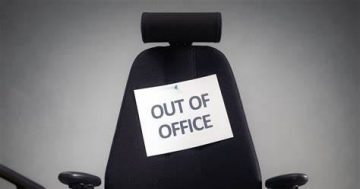While it’s not always convenient to finish your working day on the dot at 5pm, Laura Stack* has some advice to ensure you don’t find yourself putting in 70-hour weeks.
 Part of crafting a work/life balance that you can maintain indefinitely is knowing when it’s time to pack it in for the day.
Part of crafting a work/life balance that you can maintain indefinitely is knowing when it’s time to pack it in for the day.
You may not have the option of always leaving at 5pm, but then, who does these days?
Still, setting a reasonable time to leave work will keep you sane — and productive.
If you regularly read my blog, you probably know that after about 50 hours a week, the typical worker stops being productive due to both mental and physical fatigue.
Those who work 80 hours a week rarely get more done than those who work 40-to-50 hours a week, according to studies.
Too many hours also endanger your health.
There were good reasons why labour and management compromised on the 40-hour work-week a century or so ago.
They clearly knew something many of us have forgotten.
Rather than let your inner workaholic take over, try these ways of ensuring you leave on time every day.
Plan your ‘exit strategy’ in advance
In addition to creating a to-do list, visualise when you want to leave for the day, and why.
The ‘why’ is important; don’t just think: “I get to leave” when it’s time to go.
Think: “That’s when I get to go home to my family and friends,” or “that’s when I get to go to the gym.” Whatever works for you.
Set an alarm for your exit time, and structure your day in a way that lets you finish up by then.
It can help if you ensure you have a social event to attend, like a club meeting or a dinner date.
Make it clear to your co-workers that you’re leaving at a specific time
That target may not always prove as firm as you like, but it’s something to shoot for.
For one thing, it’ll make sure you budget your time properly so you’re consistently making progress.
For another, your co-workers will most likely come to you with any issues earlier in the day — and you can leave most meetings, as necessary, without feeling guilty.
Stick to your priorities
It may make you feel good to strike a low-priority item off your list, and depending upon your mood or when your energy peak strikes, that may be best.
However, you’re better served by chipping away at the big projects instead, especially during those energy peaks.
You can handle less-important tasks during energy lulls or between larger tasks, let them roll over to the next day, or just let them fall off your list.
Don’t waste time
Kick procrastination and perfectionism to the curb, rein in all the personal distractions you can, and always have something to do next.
The latter ensures you don’t have to waste time deciding what to work on.
Plan your day realistically; don’t jam it too full, defeating the purpose.
Leave a little wiggle room just in case some new high-priority item pops up.
If it doesn’t, take something off a standby list to work on until it’s time to head home.
Use little time-saving tricks when you can: For example, call instead of email when possible.
Start preparing to leave 15-to-20 minutes before quitting time
Establish an end-of-the-day routine, where you tidy up your work materials and workspace.
You make sure you file everything where it goes, get any last-minute information from co-workers, save your files, shut down your browser, clean up your desktops (virtual and physical).
Build and check your to-do list for the next work-day, focusing on high-priority and pending items (often pretty much the same).
I also recommend you review the day, focusing on what went wrong so you can fix it in the future, and what went right so you can emulate it.
Your daily quitting time shouldn’t be a big deal — just part of a productive day.
If you find yourself often pushing past a reasonable quitting time and working until seven or eight at night, then something’s wrong.
Some would say you’re incompetent because you can’t properly manage your time, and they’re not necessarily wrong.
Part of time management is ensuring you don’t push yourself to worker longer hours to catch up except in times of great need, which should be rare.
Most people won’t even notice if you work 70-hour weeks; so, put a significant portion of your time into the life part of the work/life equation.
Otherwise, what the heck are you working for besides money?
*Laura Stack is a keynote speaker, bestselling author, and authority on productivity and performance. She can be contacted at theproductivitypro.com.
This article first appeared on Laura’s blogsite.











